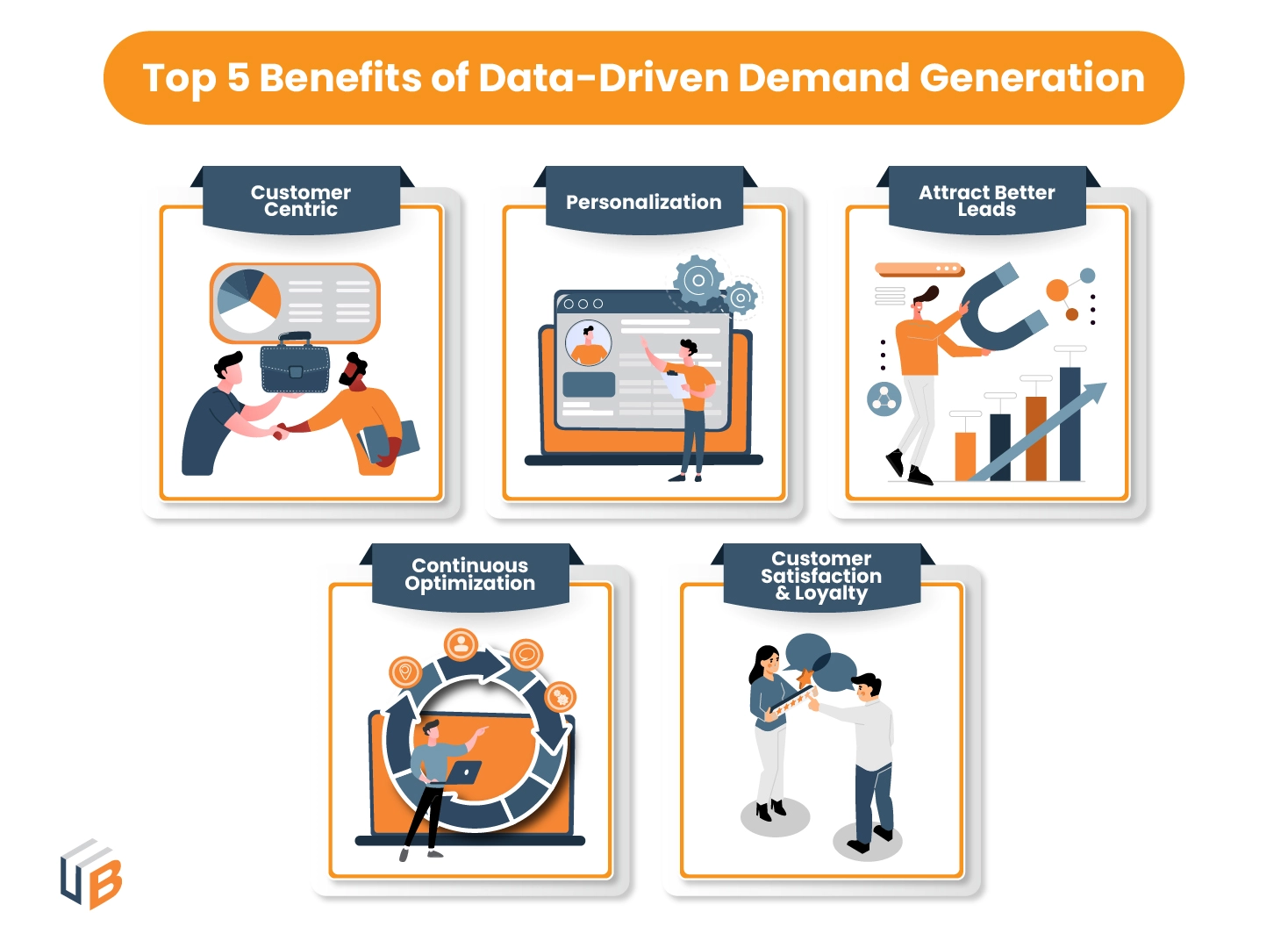
Introduction
Creating a demand generation strategy involves a multitude of decisions. Regardless of the nature of these decisions, you need evidence of success for them. Without it, those decisions are nothing more than opinions. It is only when data backs your decisions, that you can truly make reliable strategies. If you’re not big on data-driven demand generation, I believe reading this article will change your mind.
Here’s What You Need to Know About Data-Driven Demand Generation
B2B demand generation by itself is all about identifying your ideal buyers and targeting them using several marketing strategies that take them down the funnel toward conversion. The goal is to generate demand for your product and sustain that demand throughout the buyer’s journey, even after conversion to sustain them.
What data does here, is that it gives your strategies reliable insights to influence decision-making positively. Everything from confirming certain characteristics of your buyer personas to validating the results of your strategies, data validates all aspects of your marketing.
Let’s explore some tangible benefits of a data-driven demand generation strategy.

Data-Driven Demand Generation is a Customer-Centric Approach
Regardless of how you choose to generate demand for your product, if you don’t connect with your target accounts, it’s bound to fail. Data not only helps you identify who your buyer is, but also confirms their behavior patterns and their interests. For instance, creating your buyer personas involves data about your ideal buyers’ demographics, psychographics, occupations, etc.
Additionally, data allows you to block all unproven noise about your customers to eliminate speculation. So whenever you’re facing a decision, you immediately look at the data to answer “Does my buyer’s history/choices/traits confirm this?”
Data also allows you to analyze your buyer’s journey to identify touchpoints, preferences, and pain points at each stage. Giving you a nuclear view of every move your buyer makes.
Personalization Becomes the Theme of Your Demand Generation
Data-driven demand generation’s biggest benefit is that it enables personalization. That’s because companies that get personalization right have the potential to generate 40% more revenue.
In 2023, generic marketing is considered ancient and outdated. Your buyers want something personal, something that is relatable and easy to connect with.
Some of the best demand generation strategies are content marketing and advertising. Both of these require different levels of personalization at different stages of the strategies. Personalized content does significantly better than otherwise. When the user likes the content and relates to it, they are more likely to take recommended actions. Similarly, advertising also benefits from personalization. In fact, it is absolutely necessary to have a personalized approach in your copy and design for an ad.
To make personalization, a core theme of your demand generation strategy you need to acquire and implement data from your market research.
Data Helps You Attract Better Leads That Convert More
Data-driven demand generation enables you to identify high-quality leads by analyzing various data points. By understanding the characteristics and behavior of your best customers, you can refine your lead generation strategies and focus on attracting prospects that are more likely to convert into paying customers.
Lead scoring also needs data at every stage of developing the scoring model and criteria. The scoring model assigns scores to leads based on their fit and behavior, and scoring thresholds are set to determine lead qualification. Data-driven lead scoring allows you to prioritize efforts on leads with higher conversion likelihood, optimize resource allocation, and improve overall conversion rates.
Data Enables Continuous Optimization for Better Campaign Results
Setting up your campaigns, hitting the go button, and letting it cook is a recipe for a disastrous result. You need to actively monitor the situation and acquire real-time data and demand generation stats that help you understand the situation.
More often than not, you’ll miss out on titbits of changes you should’ve done before launching your campaign. Real-time data reminds you of those changes or any other thing. Using that data, you can test new approaches, and optimize marketing tactics. This iterative process ensures that your marketing efforts stay relevant, effective, and aligned with business goals.
During these campaigns, you can also follow demand generation trends. Using data, you can validate if these trends can successfully affect your strategy. Meaning, your strategy becomes agile and adaptable to immediate changes or modifications.
Data Analysis for Post-Purchase Customer Satisfaction & Loyalty
B2B SaaS companies need to spend just as much effort in retaining customers as in acquiring newer ones. Data analysis of your current customer base is a huge step towards ensuring that your valuable customers stick around.
You can collect and analyze data about your customer’s usage and lifespan to find insights about your service. You’ll find crucial errors or gaps that you need to fill for a better user experience. Not only does this help you retain customers, but it also helps you highlight certain features that your customers love.
Sharing this data with your sales team can double the advantage by allowing them to use data-backed highlights of your service to get more new customers.
Conclusion
In conclusion, embracing a data-driven approach empowers businesses to make informed decisions, optimize marketing strategies, and drive meaningful results in their demand generation efforts.
Data-driven demand generation has even smaller and more specific benefits than we discussed here. You can experience those benefits first-hand when you implement a data-driven demand generation strategy. To learn how, read: The Ultimate Guide to Create a Data-Driven B2B Demand Generation Strategy
Our blog
Latest blog posts
Tool and strategies modern teams need to help their companies grow.

B2B companies must generate leads that are ready to buy their products in order to me...

In the absence of a constant flow of leads, sales teams can't meet their targets and ...

Podcasts and webinars are powerful tools that marketers can use to reach new audience...



